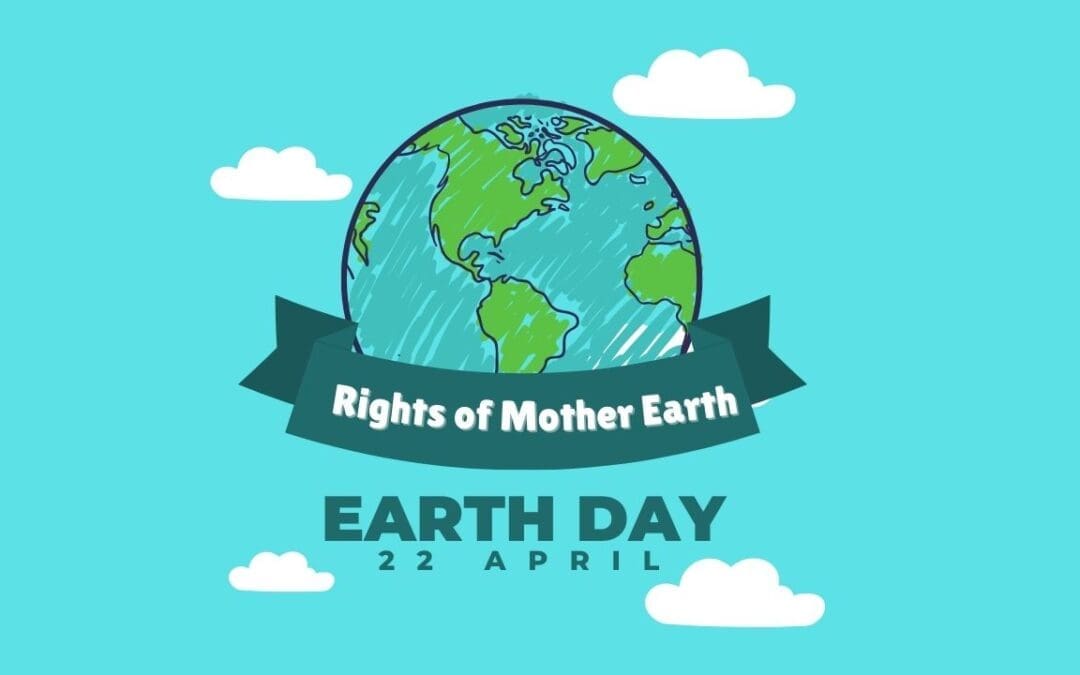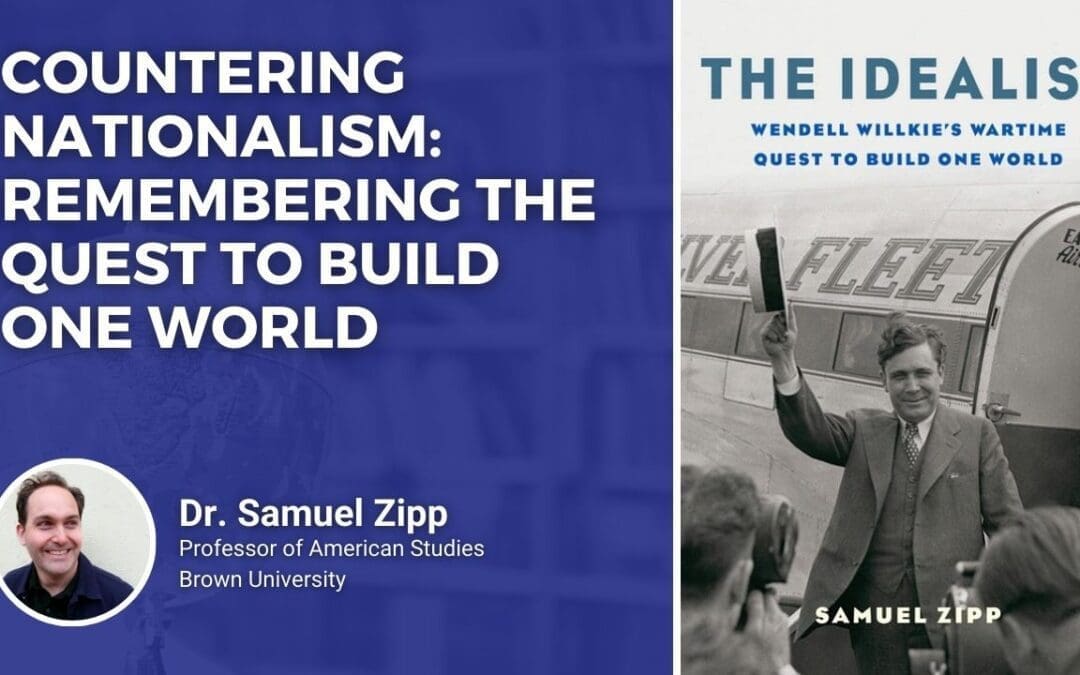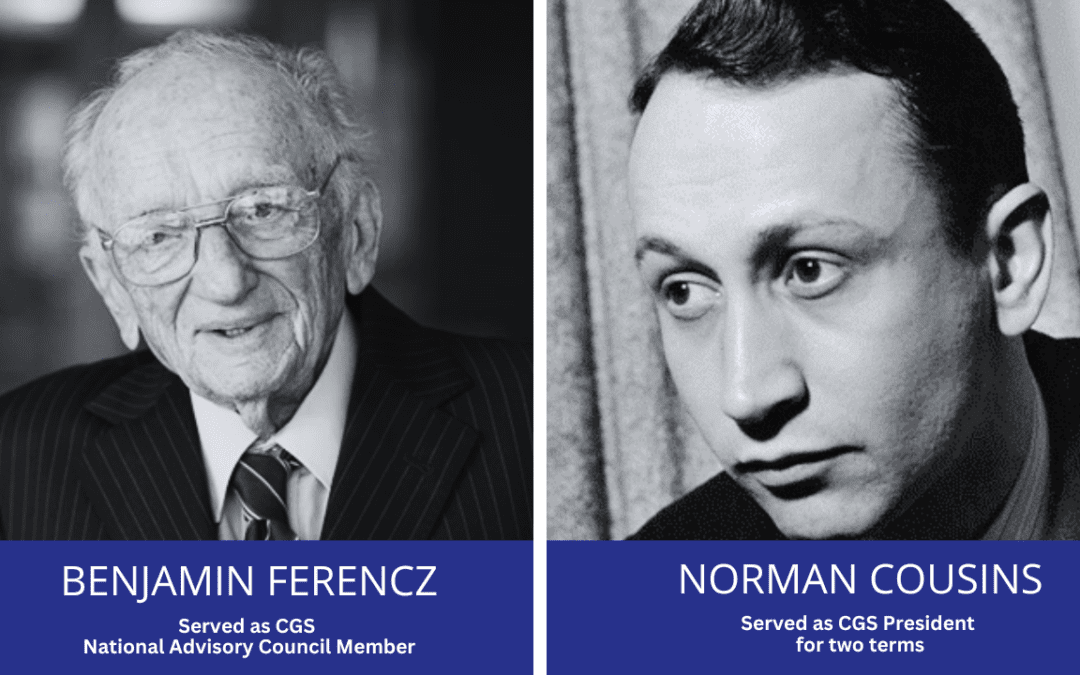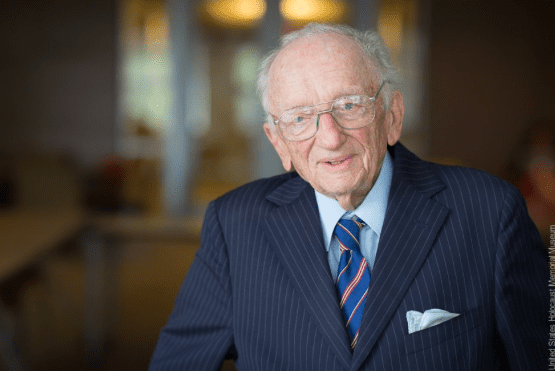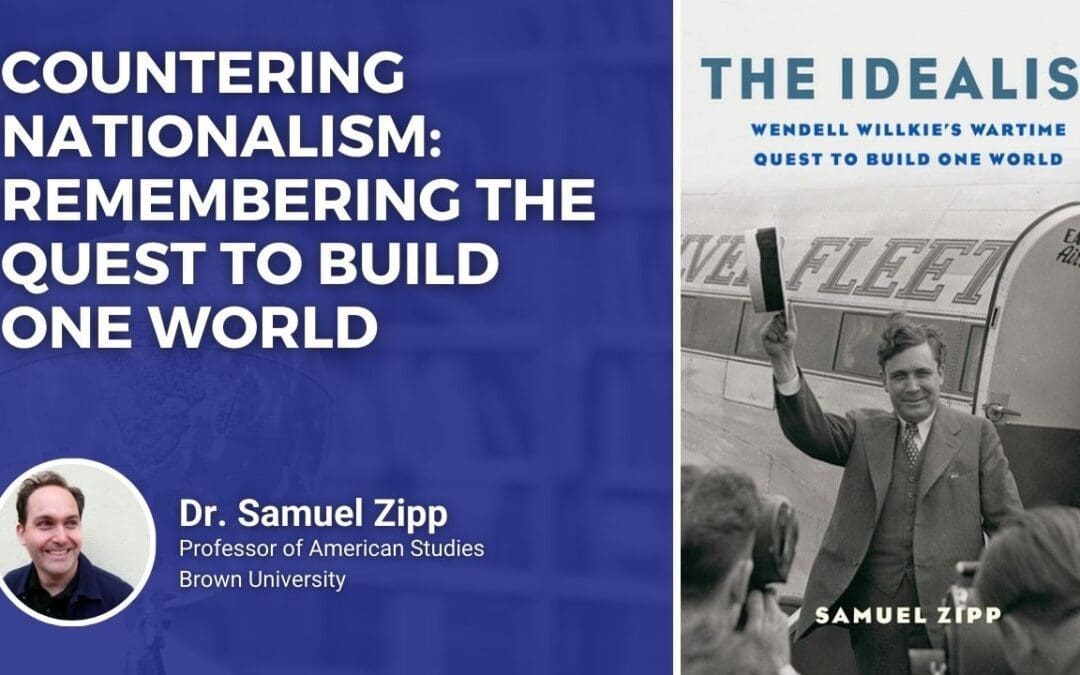
by Citizens for Global Solutions | Apr 22, 2023 | Organizational Statement
Let this Century be the Century of the Rights of Mother Earth: Strengthening Global Governance is Key to Ensuring a Sustainable Future
Washington, DC- On April 22, Citizens for Global Solutions (CGS) joins the United Nations and civil society throughout the world in celebrating International Mother Earth Day. On April 22, 2009, the Bolivian government proposed a resolution that was adopted by the United Nations General Assembly (UNGA) declaring every April 22 to be International Mother Earth Day. The resolution calls for “acknowledging that the Earth and its ecosystems are our home” and “promot(ing) harmony with nature and the Earth” to adequately address our environmental, economic, and social needs.
Evo Morales, the former President of Bolivia, strongly supported the adoption of this resolution, asserting during a meeting with the UNGA that “the twenty-first century is the century of the rights of Mother Earth and of all living beings.” During his speech, President Morales also stressed the importance of four, critical rights to which Mother Earth and all life on Earth are entitled: the right to life, the right to regenerate its biodiversity, the right to live a clear life (free of pollution and toxins), and the right to “harmony and balance with and among all and everything” (recognizing the interdependence of all life on Earth.) Furthermore, President Morales called for the incorporation of these four principles in the “Universal Declaration of the Rights of Mother Earth,” which was prepared during the World People’s Conference on Climate Change and the Rights of Mother Earth, hosted in Bolivia in 2010.
CGS and Young World Federalists (YWF) unconditionally support the principles and priorities enshrined in the Universal Declaration of the Rights of Mother Earth, and we strongly believe that ensuring a sustainable future for present and future generations can only be achieved by strengthening global governance and international environmental cooperation. Ramesh Thakur, former UN Assistant Secretary-General, argues that the “global governance deficit,” or the lack of global institutions that implement, interpret, and enforce international environmental laws and treaties, is among the factors that impede meaningful international action to address the climate crisis. Furthermore, Thakur asserts that a world order based on absolute national sovereignty- where countries are not held responsible for violating their environmental commitments- is a key cause of this lack of global environmental governance since it encourages political leaders to prioritize their own political interests over the well-being of Mother Earth.
How can we foster international cooperation and bolster global governance to address the climate crisis? One possible path forward is strengthening existing global governance institutions. This includes empowering the UNGA to pass binding international resolutions driving global emissions reduction efforts, particularly on the part of high emitting countries like the US and China.
Another pathway is to support and strengthen international legal institutions’ capacity to hold perpetrators accountable for environmental crimes. The Rome Statute, the foundational treaty of the International Criminal Court (ICC), notably includes environmental destruction within the definition of war crimes [Art 8.2(b)(iv)].Beginning in 2016, the Court announced that it would begin “considering cases involving environmental destruction, misuse of land, and land grabs as crimes against humanity.” The Office of the Prosecutor (OTP) also has communicated its intent “to cooperate and provide assistance to States, upon request, with respect to conduct which constitutes a serious crime under national law, such as . . . destruction of the environment.” Despite these notable steps, there are increasing calls to include “the crime of ecocide” as a stand-alone crime via amendment to the Rome Statute. To this end, the Independent Expert Panel for the Legal Definition of Ecocide, convened by the Stop Ecocide Foundation, formulated a draft definition of the crime, which would place ecocide on equal footing with the four crimes within the Court’s current jurisdiction: genocide, crimes against humanity, war crimes, and the crime of aggression.
Establishing the international crime of ecocide also is a key recommendation of the Environmental Governance track of the Global Futures Forum (GFF), a civil society-led conference last March which convened hundreds of NGOs and individuals from around the world to further civil society and youth input in the Summit of the Future.
An additional environmental governance recommendation from the GFF is to encourage the International Court of Justice (ICJ) to more frequently address environmental issues. While the ICJ has heard cases touching on environmental matters, beginning with the notable Nicaragua v. Costa Rica judgment (holding that Nicaragua had a duty to compensate Costa Rica for “major environmental damages to its territory,” the Court has yet to deploy a powerful potential tool for environmental justice: Currently, the ICJ’s Chamber for Environmental Matters, established in 1993, has still not heard an environmental case due in part to states’ reluctance to classify a dispute as essentially “environmental” in nature.Furthermore, a UNGA resolution last month, sponsored by Vanuatu – an island country that has disproportionately experienced the effects of the climate crisis – could signify a decisive turning point regarding the ICJ’s involvement in environmental matters. Specifically, the resolution empowers the UNGA to seek ICJ adjudication in cases concerning countries’ commitments to address climate change and where countries intentionally or negligently cause environmental degradation that affects other countries’ environmental well-being, especially nations that are most vulnerable to climate change, like island countries.
Promoting meaningful international climate action may also require creating new global governance institutions, such as an International Court for the Environment. Experts have proposed a “Climate Club” that would establish a single international target carbon price and sanction non compliant countries and countries that do not participate. Furthermore, the Environmental Governance track of the GFF called for the establishment of an “Earth Governance Regulatory Body,” which would pursue a global Decarbonization Agenda to promote a just transition to a more sustainable economy.
We at CGS and YWF are confident that the 21st century will be, as Evo Morales declared, “the century of the rights of Mother Earth and of all living beings.” Yet ensuring a sustainable future for all who call Mother Earth their home will require unprecedented, yet necessary, international action to address the climate crisis. And that starts with strengthening global environmental governance.
“Earth Day cannot be a moment for reflection alone. It must compel action. As Wendell Berry cogently stated ‘the Earth is all we have in common.’ It is our shared responsibility as a global family to embrace the theme of 2023 Earth Day and invest in our planet.” – Rebecca A. Shoot, Executive Director, Citizens for Global Solutions (CGS)
About Citizens for Global Solutions & Young World Federalists
Citizens for Global Solutions (CGS) is a non-governmental, non-profit, non-partisan membership-based organization that for more than 75 years has brought together a diverse collective of individuals and organizations with a common goal of a unified world predicated upon peace, human rights, and the rule of law. From championing ratification of the UN Charter upon our establishment in 1947 to supporting creation of the International Criminal Court (ICC) 25 years ago to advocating for global instruments to confront today’s enduring challenges of war and climate degradation, CGS recognizes that true progress is a generational enterprise. We invite like-minded individuals and organizations to join us in this mission.
The Young World Federalists (YWF) are a global movement fighting to give humanity a voice. We envision a sustainable, just, and peaceful world through a democratic world federation. A world run by humanity, for humanity, providing equal opportunity to all on a thriving planet. YWF is currently engaged in a #SaveEarth campaign, which is focused on prosecuting crimes against the environment, taking effective action on climate change, and building a sustainable economy.
Contact: Rebecca Shoot outreach@globalsolutions.org

by Citizens for Global Solutions | Apr 22, 2023 | Past Event
CGS’s first Global Conversations online event, Saturday, April 22 from 12-1:30 EST with Samuel Zipp to discuss his book, The Idealist: Wendell Willkie’s Wartime Quest to Build One World (you can purchase at the Harvard book store. In August 1942, as the threat of #fascism swept the world, a charismatic former Republican presidential contender, Wendell Willkie, took an unprecedented airplane journey around the world to visit battlefronts in Africa, the Middle East, Russia, and China. In One World, the runaway bestseller he published on his return, Willkie challenged Americans to resist the “America first” doctrine and warned of the dangers of “narrow nationalism”. He urged citizens to end colonialism and embrace, “equality of opportunity for every race and every nation”. Zipp argues that Willkie’s “warnings about the perils of racially charged ‘narrow nationalism’ have never been more indispensable. As the United States reaches the end of its long turn as a great global power, the quandaries of American exceptionalism he faced remain ours today, and his example may yet offer us undiscovered resources for living in a ‘one world’ he heralded more than three-quarters of a century ago.” “The term Willkie helped to put into common circulation -’one world’ –would become shorthand for the disruptive charge of worldly connection set off by the war. Over the years Willkie’s name would fade away but ‘one world’ would be adopted by world government advocates, anti-imperialists, environmentalists, and even corporate marketers to signify the promise of times in which global shrinkage offered new contracts and new ideas to offset the dangers of war, xenophobia and racism.” Samuel Zipp is a cultural and urban historian at Brown University. He has written for the New York Times, the Washington Post, n+1, The Baffler, and The Nation and is the author of Manhattan Projects: The Rise and Fall of Urban Renewal Cold War New York. He also coedited a collection of the writings of Jane Jacobs.

by Citizens for Global Solutions | Apr 15, 2023 | Global Justice
The little known story of how American public outrage capitulated German lawmakers to compensate Polish survivors of Ravensbrück
With the passing of Benjamin Ferencz on April 7, humanity lost a tireless advocate for justice, world law, and human rights. Ben was a long-time CGS supporter, served as a National Council Advisor, and a world federalist.
On November 11, 2018, Citizens for Global Solutions honoured Ben with the Norman Cousins Global Governance Award which recognized his substantial contributions to world federation and improving global governance.
The following excerpt is Ben speaking at the awards ceremony about his friendship with Norman Cousins as well as their work ensuring compensation for the Ravensbrück survivors.
Ben’s Reflections on Receiving the Norman Cousins Global Governance Award:
A number of the Polish Catholic girls who were interned in the Ravensbrück Concentration Camp, and there they were subjected to a series of medical experiments by the Nazi troops in order to test out whether various glass in the wounds and sand in the wounds and other horrible experiments–how long will it take to cure them and what it took not to cure them.
And this is the subject of one of the subsequent Nuremberg trials, known as the Medical Case, which was one of the first cases after the trial by the International Military Tribunal against Göring.
Caroline Ferriday who is lady of some means and she had arranged to visit a number of the Polish Catholic girls who were interned in the Ravensbrück Concentration camp and there they were subjected to a series of medical experiments by the Nazi troops in order to test out whether the various glass in the wounds and sand in the wounds and- other other horrible experiments – how long will it take to cure them on what it took to not cure them and this is the subject of one of the subsequent Nuremberg trials, known as the Medical Case, was one of the first cases after the trial by the International Military Tribunal against Göring.
So, she was aware of this and she went to Norman Cousins and said, “Well, you are taking care of this Hiroshima Maidens, can’t you do the same for these Ravensbrück lapins?” Because lapins is French for “rabbits” or “guinea pigs” and were being used as human guinea pigs. And he agreed to try and help her and he set up a small committee. I was the pro bono counsel to that Committee because I negotiated with the German government about compensation for all of the Nazi persecution. And so, she visited me and I said I would try to get the German governments to agree, but it would be difficult because we had a complicated indemnification law. And it had no provision or made for compensate anybody in Poland and the Germans took a very harsh position.
Saying, look, we were at war with this country, they were killing our soldiers there we’re not going to compensate anybody our country with which we were at war. And the Committee took a dim view of that.
I met with the German Ambassador in Washington, and I said, “Look this is an exceptional case.” He said, “I’m sorry this is built with the legislature which we’ve done as much we tend to do.”
Whereupon the Committee arranged with Pan Am to fill up a plane with the ladies that we call the ‘Ladies from Ravensbrück’ and bring them to New York. And there we arranged for a ceremony to take place on the steps of St. Patrick’s Cathedral where they were greeted by the bishop or whoever it was saying, “you know, women of Ravensbrück, look what terrible things the Nazis did to you, and they refuse to compensate you for the lapins!” And so, we got a lot of publicity and the German Ambassador, whom I had pretty good relations, he sent me a copy of the cable that he had sent to Bonn [Germany].
Saying this is not a financial problem, this is a political problem so get them out of here. They’re going to go, we had arranged this visit, all the Senators who had a Polish constituency in the Senate to welcome the girls from Poland saying, oh look how terribly they were treated by the Nazis, and they won’t compensate them for anything, any come with you excuses and so on.
So, we’re going to put high pressure on and the Germans had to capitulate. And I was present in Bonn when the Cabinet called a Special Meeting on this question, whether they could expand their laws. And they all said, “make sure that that Ferencz guy doesn’t get involved in this thing. Anyway, he’s just making it hard until we don’t want anything to do with him.” I said that’s fine! But would you deal with the Red Cross, the International Committee of the Red Cross? And they agreed.
So, I flew to Geneva and set up arrangements whereby the German Government agreed to pay a fixed sum agreement. Norman Cousins was really the leader of the team meetings that took place in his office usually and he was fully involved, and he was writing about it all the time. So, it was largely as a result of his efforts that many people would not have been compensated.
We created whole system and Norman was really the leader of this and our meetings took place in his office, and he was fully involved, and he was writing about it all the time. So, it was largely as a result of his efforts that many people would not have been compensated, did receive compensation for some terrible wounds taken on deliberately by the Nazi regime. So, Norman and I were good friends, and I followed his career. When he was finally ill, and I recognized that he extended his own life expectancy by adopting of philosophy of making jokes and trying to keep up with your humor and everything he did certainly extended his life and he was a great man. I’m very honored to receive any award which bears his name.
Benjamin Ferencz is remembered for being a lead investigator in the Nuremberg Trials where all of the 22 defendants were convicted and a tireless advocate for the International Criminal Court (ICC). Additionally, Ben was also a staunch world federalist and served on CGS’s National Advisory Council for decades and is the author of Planethood, which makes the case for a democratic world government. May his legacy be an inspiration for justice and peace.
Norman Cousins was the editor of the Saturday Review for more than thirty years and had a powerful platform from which to help shape American public debate during the height of the Cold War. Under Cousins’ leadership, the magazine was considered one of the most influential in the literary world. Cousins’ progressive, nonpartisan editorials in the Review earned him the respect of the public and US government officials. Norman was also a world federalist and peace activist and served as CGS’s President twice from 1952-1954 and again from 1976-1990.

by Citizens for Global Solutions | Apr 14, 2023 | Press Release
“By any rational standard what we are setting out to do is quite impossible. But we must do it, we can and we will!”
This is the inspirational message in support of democratic world government that longtime CGS supporter and National Advisory Council member Benjamin Ferencz prepared while drafting the lecture he would give at the Second Global Structures Convocation in February of 1992. The chief prosecutor of the Einsatzgruppen Trial- one of the Nuremberg Trials- at the age of 27, a tireless advocate for the International Criminal Court and a democratic world government, and an exceptional human being, Ben Ferencz had a life that was instructed by a simple yet powerful motto: “Never give up.” It is a fitting guiding principle for a person whose life was dedicated to campaigning for a democratic world federation to safeguard the sanctity of human life, a seemingly impossible yet necessary task that requires a “never give up” attitude that Ben embodied with his whole being.
In 1988, Ben teamed up with personal growth writer Ken Keyes, Jr. to write Planethood, a book directed to the general public that laid out eight practical steps to achieve a democratic world government. In the book, Ferencz and Keyes argue that “We must begin to think in planetary terms if we are to find peace.” Like many other people, we at Citizens for Global Solutions find Ferencz and Keyes’ message to be extremely hopeful since it advocates for a grassroots movement to establish a “United Federation of Nations”; We the People can really do this, provided that we “never give up!” And we are extremely grateful that Ferencz donated an entire print run of his book to CGS! Building off of Planethood, one of the most important, basic ideas Ferencz expressed in his literary works regarding world federalism is the importance of replacing the “rule of force with the rule of law” through the establishment of courts with universal jurisdiction. As Ferencz has asserted, “There can be no peace without justice, no justice without law and no meaningful law without a Court to decide what is just and lawful under any given circumstance.”
Ben’s indefatigable commitment to an International Criminal Court, with full US participation, and a democratic world government- in addition to his active involvement in CGS’ National Advisory Council- made him an obvious choice to receive the 2018 Norman Cousins Global Governance Award. Ben also was honored with the 2022 Congressional Gold Medal, which recognized his dedication to the international rule of law. In Section 2 (Findings) of the bill recognizing Ferencz, the 11th point is particularly notable:
Ben, at age 101, is still active, giving speeches throughout the world about lessons learned during his extraordinary career. He is compelled by the imperative to “replace the rule of force with the rule of law”… He often tells young people to “never give up” because the fight for peace and justice is worth the long struggle ahead.
On January 17th, 1961, President Dwight Eisenhower gave a speech warning the public of the dire, antidemocratic threats posed by the “military industrial complex.” He argued that, “In the councils of government, we must guard against the acquisition of unwarranted influence… by the military-industrial complex. The potential for the disastrous rise of misplaced power exists and will persist.” Thanks to Ben Ferencz’s tireless dedication to a safer, more just world, we have a North Star that can, provided we “never give up,” guide all living beings on planet Earth toward a more sustainable future. In the words of CGS board member Larry David, “Ben Ferencz, we are forever indebted to your service in the cause of peace, justice, and our dream of a federal republic of the world – a true United Federation of Nations!”
About Citizens for Global Solutions
CGS is a non-governmental, non-profit, non-partisan membership-based organization that for more than 75 years has brought together a diverse collective of individuals and organizations with a common goal of a unified world predicated upon peace, human rights, and the rule of law. From championing ratification of the UN Charter upon our establishment in 1947 to supporting creation of the International Criminal Court (ICC) 25 years ago to advocating for global instruments to confront today’s enduring challenges of war and climate degradation, CGS recognizes that true progress is a generational enterprise. We invite like-minded individuals and organizations to join us in this mission.
Contact: Donna Park dpark@globalsolutions.org

by Citizens for Global Solutions | Apr 10, 2023 | Press Release
Washington, DC–Join Citizens for Global Solutions on April 22 for a special Q&A Global Conversations online event with author, Samuel Zipp to discuss his book, The Idealist: Wendell Willkie’s Wartime Quest to Build One World.
Participants: You and your fellow attendees will have the chance to learn about Countering Nationalism and Remembering the Quest to Build One World. Attend the FREE event and enter a chance to win Samuel Zipp’s book!
April 22 | 12:00PM – 1:30PM
Click here to register for the FREE event!
In August 1942, as the threat of fascism swept the world, a charismatic former Republican presidential contender, Wendell Willkie, took an unprecedented airplane journey around the world to visit battlefronts in Africa, the Middle East, Russia, and China. In One World, the runaway bestseller he published on his return, Willkie challenged Americans to resist the “America first” doctrine and warned of the dangers of “narrow nationalism”. He urged citizens to end colonialism and embrace, “equality of opportunity for every race and every nation”.
Zipp argues that Willkie’s “warnings about the perils of racially charged ‘narrow nationalism’ have never been more indispensable. As the United States reaches the end of its long turn as a great global power, the quandaries of American exceptionalism he faced remain ours today, and his example may yet offer us undiscovered resources for living in a ‘one world’ he heralded more than three-quarters of a century ago.”
“The term Willkie helped to put into common circulation -’one world’ –would become shorthand for the disruptive charge of worldly connection set off by the war. Over the years Willkie’s name would fade away but ‘one world’ would be adopted by world government advocates, anti-imperialists, environmentalists, and even corporate marketers to signify the promise of times in which global shrinkage offered new contracts and new ideas to offset the dangers of war, xenophobia and racism.”
Samuel Zipp is a cultural and urban historian at Brown University. He has written for the New York Times, the Washington Post, n+1, The Baffler, and The Nation and is the author of Manhattan Projects: The Rise and Fall of Urban Renewal Cold War New York. He also coedited a collection of the writings of Jane Jacobs.
“As a resident of Minnesota, home of a key founder of the UN, Governor Stassen, I have been a long-time devotee of the writings and speeches of Wendell Willkie. This book finally puts this internationally important leader into a truly global context.” Mark Ritchie, National Advisory Committee for Citizens For Global Solutions, former President of Global Minnesota and former Minnesota Secretary of State.
About Citizens for Global Solutions
CGS is a non-governmental, non-profit, non-partisan membership-based organization that for more than 75 years has brought together a diverse collective of individuals and organizations with a common goal of a unified world predicated upon peace, human rights, and the rule of law. From championing ratification of the UN Charter upon our establishment in 1947 to supporting creation of the International Criminal Court (ICC) 25 years ago to advocating for global instruments to confront today’s enduring challenges of war and climate degradation, CGS recognizes that true progress is a generational enterprise. We invite like-minded individuals and organizations to join us in this mission.
Contact: Donna Park dpark@globalsolutions.org
